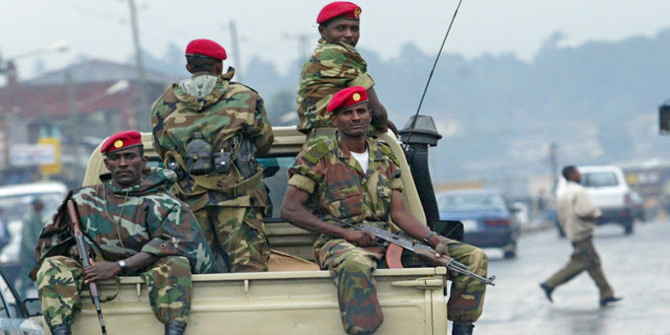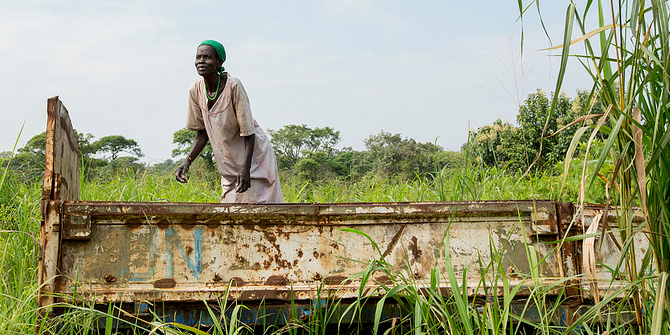LSE’s Matthew Engelke paints a personal and professional portrait of one of Zimbabwe’s foremost storytellers, Chenjerai Hove.
Chenjerai Hove, the renowned Zimbabwean author, has died. He passed away on Sunday 12 July 2015 in Norway, where he had been living in exile for several years as part of the International Cities of Refuge Network (ICORN), in Stavanger.

Hove was born in Mazvihwa, Zimbabwe, in 1956, and educated at Kutama College, later taking degrees at the University of South Africa and the University of Zimbabwe. He was a teacher and worked in editing before becoming a full-time writer. He was the author of numerous works of poetry, prose, plays, children’s stories, and social criticism, much of it translated into German, Dutch, Swedish, Norwegian, and Japanese. Throughout his career he won several awards, including the 1989 Noma Award for Publishing in Africa, the 2001 German-Africa Prize, and two Zimbabwe Literary Awards. He was a visiting professor at Lewis and Clark College in 1994 and a fellow at Brown University in 2007-08. He was the inaugural president of the Zimbabwe Writer’s Union and a founding member and board member (1990-2000) of the Zimbabwe Human Rights Association.
Hove’s most well-known work, Bones, is about the effects of the Liberation War on Marita, the mother of a freedom fighter, told through a number of voices and perspectives. Published first in 1988, it was one of many key texts by Zimbabwean authors exploring the impacts of the war—the Second Chimurenga. What makes Bones distinct is its richly infused poetic language; while written in English, Bones has the texture of his native Shona, a language in which he also often wrote, and to which he was deeply committed. Bones is also notable because of its sensitive portrayal of a soldier’s mother; Hove was very close to his own mother and indeed often spoke of identifying most with her, and with the domestic work she did around his musha (homestead), as a child.
Hove was a patriot but not a nationalist. Like others of his generation, he was committed to the cause of liberation, but he saw, from a very early stage, that Robert Mugabe’s regime was both brutal and corrupt. In his collection of essays, Shebeen Tales (1994), Hove lamented the false dawn of democracy in Zimbabwe, criticising the state’s “harsh police machinery.” “Praise singers, flatterers and sycophants have a field day,” he goes on. “The right of access to information, the right of every citizen to participate in national debates, is relegated to the dustbin.”
That dustbin became a funeral pyre after 2000, when Mugabe’s grip tightened and the country entered full-scale political and economic crisis. It was shortly after this, in 2001, that Hove fled the country (having been tipped off by a relative of pending trouble; kinship still counted for the Hove clan). He went first to France, to Versailles, but spent most of the rest of his life in Norway, with a couple of sojourns to the United States (Miami in addition to his time at Brown).
From his self-imposed exile, Hove continued to write, and to criticise the Mugabe regime, but his literary publishing pace slowed and the absence from Zimbabwe took its toll.
I met Chenjerai when I was as an undergraduate student, during a semester abroad at the University of Zimbabwe where he was Writer-in-Residence, in 1993. I was taking Shona lessons, and I asked him if his name really meant “Beware of Fish” (it does, at least literally). He thought that was pretty funny for a first question. Chenjerai always made time for students—for anyone, actually—and we ended up becoming friends. During subsequent spells in Harare, I often visited him at his house, and in 1999 I joined his sport’s club, which, so far as I could tell, was really a drinking club—although he assured me, with a laugh, that a few old-time Rhodies (white Zimbabweans who still identified with colonial Rhodesia) still came on weekend afternoons to do lawn bowling.
Chenjerai laughed a lot; the more absurd a situation—the more politically bleak or marked by hypocrisies and pieties—the more he would break down, in short-breath giggles, often with his hand extended for a quick shake and then snap of the fingers. Yet he could very quickly become serious, too, as when he read his poetry in his sonorous poet’s voice.
Sometimes in Zimbabwe we took road trips, during which he would put some King Sunny Adé on the tape deck, a special favourite, or just talk, endlessly but inspirationally, about whatever was to be seen out of the car window. He read the history of his country in its landscape, and seemed to have a story at hand for every moment.
Chenjerai was a stereotypical artist in many ways: you couldn’t imagine him paying a phone bill, washing the dishes (despite his mother’s strong influences), or, say, remembering to pack his toothbrush. He lived off people, words, and ideas (and snuff); indeed I rarely ever saw him eat, even when we went out to eat. At the club in Harare, it was a beer; in London or Oxford or Versailles—where we got to see each other on occasions over the past 13 years—it was a glass of white wine.
Chenjerai inspired, and supported, many creative writers both within and beyond Zimbabwe. Every time I saw him during his exile years, he would tell me about new young writers to look out for, back home in Zimbabwe or elsewhere, whom he’d met at some festival or event. And he shared. When we last saw each other, last year, he gave my 9-year-old daughter a manuscript copy of a children’s tale he had been working on, wanting her feedback.
Chenjerai Hove will be greatly missed by many people. Zimbabwe has lost a true and dedicated son and I am particularly sad—and angry—that he never got to return home, to participate once again in the cultural life and daily life of the place he loved so much.
Matthew Engelke is a Professor of Anthropology at LSE.
The views expressed in this post are those of the authors and in no way reflect those of the Africa at LSE blog or the London School of Economics and Political Science.






1 Comments